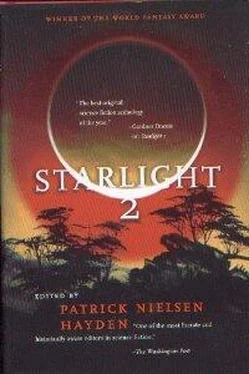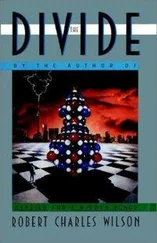Robert Wilson - Divided by Infinity
Здесь есть возможность читать онлайн «Robert Wilson - Divided by Infinity» весь текст электронной книги совершенно бесплатно (целиком полную версию без сокращений). В некоторых случаях можно слушать аудио, скачать через торрент в формате fb2 и присутствует краткое содержание. Год выпуска: 1998, ISBN: 1998, Издательство: Tor Books, Жанр: Фантастика и фэнтези, на английском языке. Описание произведения, (предисловие) а так же отзывы посетителей доступны на портале библиотеки ЛибКат.
- Название:Divided by Infinity
- Автор:
- Издательство:Tor Books
- Жанр:
- Год:1998
- ISBN:0-312-86184-2
- Рейтинг книги:5 / 5. Голосов: 1
-
Избранное:Добавить в избранное
- Отзывы:
-
Ваша оценка:
- 100
- 1
- 2
- 3
- 4
- 5
Divided by Infinity: краткое содержание, описание и аннотация
Предлагаем к чтению аннотацию, описание, краткое содержание или предисловие (зависит от того, что написал сам автор книги «Divided by Infinity»). Если вы не нашли необходимую информацию о книге — напишите в комментариях, мы постараемся отыскать её.
(an anthology edited by Patrick Nielsen Hayden, Tor Books, ISBN 0-312-86184-2).
Included in Robert Charles Wilson's collection
published in 2000 (Tor Books, ISBN 0-312-87374-3).
Nominated for Hugo Award for Best Novelette in 1999.
Divided by Infinity — читать онлайн бесплатно полную книгу (весь текст) целиком
Ниже представлен текст книги, разбитый по страницам. Система сохранения места последней прочитанной страницы, позволяет с удобством читать онлайн бесплатно книгу «Divided by Infinity», без необходимости каждый раз заново искать на чём Вы остановились. Поставьте закладку, и сможете в любой момент перейти на страницу, на которой закончили чтение.
Интервал:
Закладка:
Divided by Infinity
by Robert Charles Wilson
1.
In the year after Lorraine’s death I contemplated suicide six times. Contemplated it seriously, I mean: six times sat with the fat bottle of clonazepam within reaching distance, six times failed to reach for it, betrayed by some instinct for life or disgusted by my own weakness.
I can’t say I wish I had succeeded, because in all likelihood I did succeed, on each and every occasion. Six deaths. No, not just six. An infinite number.
Times six.
There are greater and lesser infinities.
But I didn’t know that then.
I was only sixty years old.
I had lived all my life in the city of Toronto. I worked thirty-five years as a senior accountant for a Great Lakes cargo brokerage called Steamships Forwarding, Ltd., and took an early retirement in 1997, not long before Lorraine was diagnosed with the pancreatic cancer that killed her the following year. Back then she worked part-time in a Harbord Street used-book shop called Finders, a short walk from the university district, in a part of the city we both loved.
I still loved it, even without Lorraine, though the gloss had dimmed considerably. I lived there still, in a utility apartment over an antique store, and I often walked the neighborhood—down Spadina into the candy-bright intricacies of Chinatown, or west to Kensington, foreign as a Bengali marketplace, where the smell of spices and ground coffee mingled with the stink of sun-ripened fish.
Usually I avoided Harbord Street. My grief was raw enough without the provocation of the bookstore and its awkward memories. Today, however, the sky was a radiant blue, and the smell of spring blossoms and cut grass made the city seem threatless. I walked east from Kensington with a mesh bag filled with onions and Havarti cheese, and soon enough found myself on Harbord Street, which had moved another notch upscale since the old days, more restaurants now, fewer macrobiotic shops, the palm readers and bead shops banished for good and all.
But Finders was still there. It was a tar-shingled Victorian house converted for retail, its hanging sign faded to illegibility. A three-legged cat slumbered on the cracked concrete stoop.
I went in impulsively, but also because the owner, an old man by the name of Oscar Ziegler, had sent an elaborate bouquet to Lorraine’s funeral the previous year, and I felt I owed him some acknowledgment. According to Lorraine he lived upstairs and never left the building.
The bookstore hadn’t changed on the inside, either, since the last time I had seen it. I didn’t know it well (the store was Lorraine’s turf and as a rule I had left her to it), but there was no obvious evidence that more than a year had passed since my last visit. It was the kind of shop with so much musty stock and so few customers that it could have survived only under the most generous circumstances—no doubt Ziegler owned the building and had found a way to finesse his property taxes. The store was not a labor of love, I suspected, so much as an excuse for Ziegler to indulge his pack-rat tendencies.
It was a full nest of books. The walls were pineboard shelves, floor to ceiling. Free-standing shelves divided the small interior into box canyons and dimly lit hedgerows. The stock was old and, not that I’m any judge, largely trivial, forgotten jazz-age novels and belles-lettres, literary flotsam.
I stepped past cardboard boxes from which more books overflowed, to the rear of the store, where a cash desk had been wedged against the wall. This was where, for much of the last five years of her life, Lorraine had spent her weekday afternoons. I wondered whether book dust was carcinogenic. Maybe she had been poisoned by the turgid air, by the floating fragments of ivoried Frank Yerby novels, vagrant molecules of Peyton Place and The Man in the Gray Flannel Suit .
Someone else sat behind the desk now, a different woman, younger than Lorraine, though not what anyone would call young. A baby-boomer in denim overalls and a pair of eyeglasses that might have better suited the Hubble space telescope. Shoulder-length hair, gone gray, and an ingratiating smile, though there was something faintly haunted about the woman.
“Hi,” she said amiably. “Anything I can help you find?”
“Is Oscar Ziegler around?”
Her eyes widened. “Uh, Mr. Ziegler? He’s upstairs, but he doesn’t usually like to be disturbed. Is he expecting you?”
She seemed astonished at the possibility that Ziegler would be expecting anyone, or that anyone would want to see Ziegler. Maybe it was a bad idea. “No,” I said, “I just dropped by on the chance… you know, my wife used to work here.”
“I see.”
“Please don’t bother him. I’ll just browse for a while.”
“Are you a book collector, or—?”
“Hardly. These days I read the newspaper. The only books I’ve kept are old paperbacks. Not the sort of thing Mr. Ziegler would stock.”
“You’d be surprised. Mysteries? Chandler, Hammett, John Dickson Carr? Because we have some firsts over by the stairs…”
“I used to read some mysteries. Mostly, though, it was science fiction I liked.”
“Really? You look more like a mystery reader.”
“There’s a look?”
She laughed. “Tell you what. Science fiction? We got a box of paperbacks in last week. Right over there, under the ladder. Check it out, and I’ll tell Mr. Ziegler you’re here. Uh—”
“My name is Keller. Bill Keller. My wife was Lorraine.”
She held out her hand. “I’m Deirdre. Just have a look; I’ll be back in a jiff.”
I wanted to stop her but didn’t know how. She went through a bead curtain and up a dim flight of stairs while I pulled a leathery cardboard box onto a chair seat and prepared for some dutiful time-killing. Certainly I didn’t expect to find anything I wanted, though I would probably have to buy something as the price of a courtesy call, especially if Ziegler was coaxed out of his lair to greet me. But what I had told Deirdre was true; though I had been an eager reader in my youth, I hadn’t bought more than an occasional softcover since 1970. Fiction is a young man’s pastime. I had ceased to be curious about other people’s lives, much less other worlds.
Still, the box was full of forty-year-old softcover books, Ace and Ballantine paperbacks mainly, and it was nice to see the covers again, the Richard Powers abstracts, translucent bubbles on infinite plains, or Jack Gaughan sketches, angular and insectile. Titles rich with key words: Time, Space, Worlds, Infinity. Once I had loved this sort of thing.
And then, amongst these faded jewels, I found something I did not expect—
And another. And another.
The bead curtain parted and Ziegler entered the room.
He was a bulky man, but he moved with the exaggerated caution of the frail. A plastic tube emerged from his nose, was taped to his cheek with a dirty Band-Aid and connected to an oxygen canister slung from his shoulder. He hadn’t shaved for a couple of days. He wore what looked like a velveteen frock coat draped over a T-shirt and a pair of pinstriped pajama bottoms. His hair, what remained of it, was feathery and white. His skin was the color of thrift-shop Tupperware.
Despite his appearance, he gave me a wide grin.
“Mr. Ziegler,” I said. “I’m Bill Keller. I don’t know if you remember—”
He thrust his pudgy hand forward. “Of course! No need to explain. Terrible about Lorraine. I think of her often.” He turned to Deirdre, who emerged from the curtain behind him. “Mr. Keller’s wife…” He drew a labored breath. “Died last year.”
“I’m sorry,” Deirdre said.
“She was… a wonderful woman. Friendly by nature. A joy. Of course, death isn’t final… we all go on, I believe, each in his own way…”
Читать дальшеИнтервал:
Закладка:
Похожие книги на «Divided by Infinity»
Представляем Вашему вниманию похожие книги на «Divided by Infinity» списком для выбора. Мы отобрали схожую по названию и смыслу литературу в надежде предоставить читателям больше вариантов отыскать новые, интересные, ещё непрочитанные произведения.
Обсуждение, отзывы о книге «Divided by Infinity» и просто собственные мнения читателей. Оставьте ваши комментарии, напишите, что Вы думаете о произведении, его смысле или главных героях. Укажите что конкретно понравилось, а что нет, и почему Вы так считаете.












